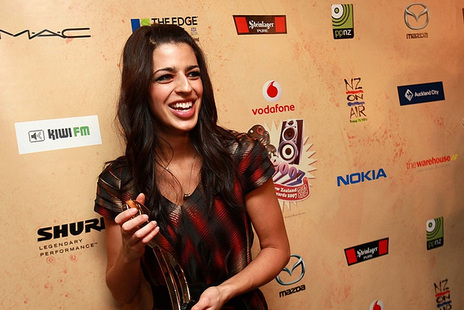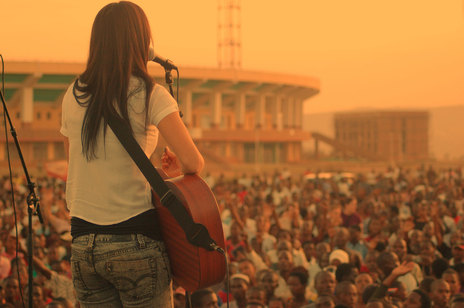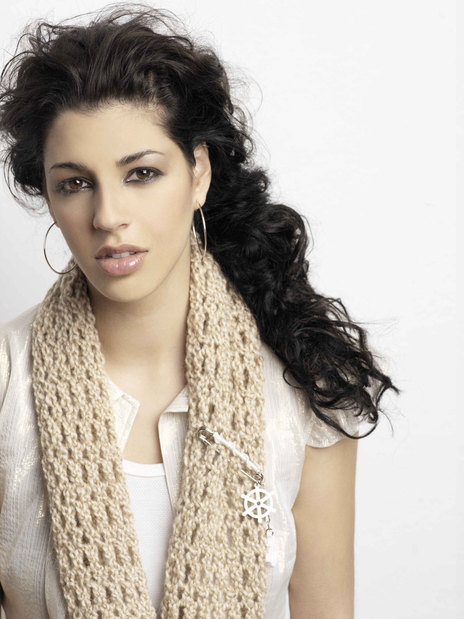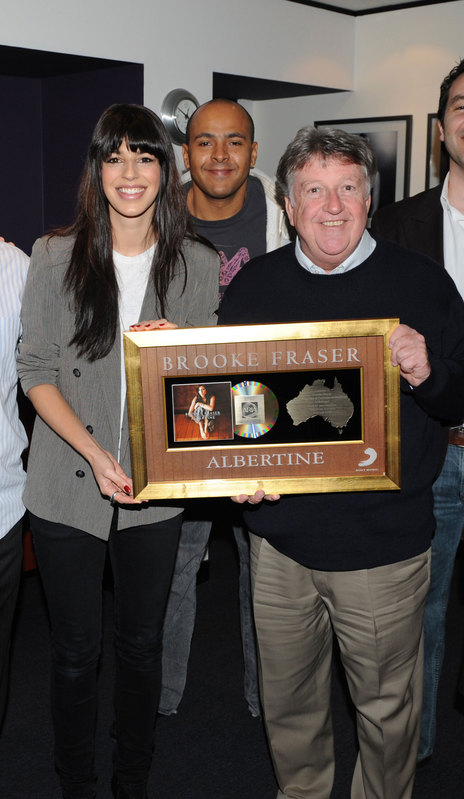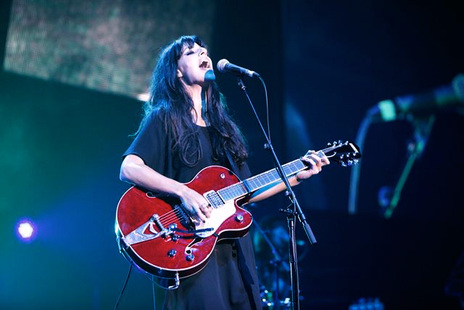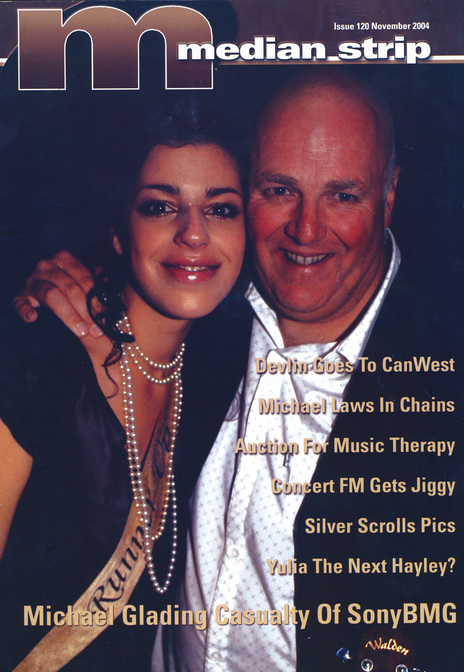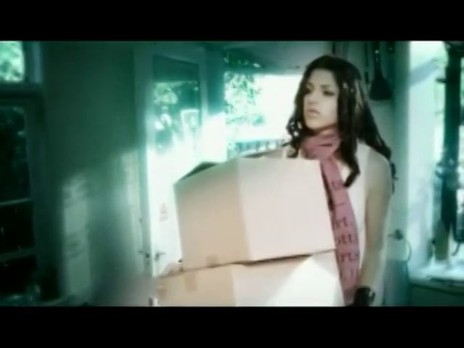Fraser carries herself with all the confidence, cheerfulness and naivety one might expect from a young woman with a deep and meaningful relationship with Jesus. It’s there all over her album, too: Singer-songwriter fare that betrays years sitting in her bedroom listening to James Taylor, Sheryl Crow and Sarah McLaughlin, infused with lyrics that could be about boy-girl situations, but could equally be about something altogether more supernatural.
The perfect poster girl for the Parachute ethos, Fraser doesn’t need to fight her demons like generations of soul and rock and roll legends for whom the gospel truth is at vast odds with the secular, fornicating, devil-worshiping end of popular music. She has grown up listening to confessional singer-songwriters emoting about the important things in their lives, so she sees no contradictions.
“It was important to hear people singing about stuff that mattered, real stuff,” she says. “I wasn’t interested in hearing about shakin’ it all night long, or getting it on all night on the dance floor. Those never grabbed me. That was unusual for my age, and where I was living, in an affluent area, it was all about Top 40 and R&B and hip-hop and I would go home and listen to these mournful guitar slingers. But I just loved it.”
And Fraser says it wasn’t a conscious decision to go secular, either.
“The songs on the album, ‘Lifeline’ particularly, I’ve been playing them at Parachute since I was 16 or 17. It just happened to be, by divine hand, that the songs that I write aren’t premeditated. If I decide to write a song about love or Africa, it doesn’t work. Later, I might read my lyrics back and go, ‘oh, it’s influenced by something I’ve read, or this verse from the Bible'."
“Ben King from Goldenhorse talks about songwriting being like a sausage machine, like you put all the guts and stuff in the sausage machine … It’s gross, eh? I don’t even like sausages! But it gets ground up and processed through you, the way you see things and your life and experiences and I suppose my sausages [laughs] have always been palatable to both a church-based audience and a mainstream one as well, and that’s exactly how I like it.”
What To Do With Daylight achieved gold status in just one week, and ended up going seven times platinum with over 105,000 copies sold in NZ alone.
Brooke Fraser grew up in Wellington – daughter of former All Black legend Bernie Fraser and his wife Lynda – where she was born on December 15, 1983, and where she attended Naenae College. It’s also where she learned piano from the age of seven, and wrote her first song at the age of 12.
“I remember it wasn’t like ‘I want to be a songwriter’, it was just that every day when I came home after school I would play the piano and sing, and I just got bored playing other people’s songs, and it was like ‘I’m going to make some up’, and it was a practical thing for me. And at 12 and 13 you don’t have a lot of life experience to express. I would just borrow chord progressions from other songs and write melodies over them, so it was almost like arrangement with the way that writing started happening for me. Wordsmithing. And from that mosaic of influences, my own style began to emerge.”
In 2000, she performed for the first time at Christian music festival Parachute, and that same year started working for Christian magazine Soul Purpose (aim: to promote Christian values and morals), but after writing for and eventually editing the magazine, in 2002 she gave it up to move to Auckland and concentrate on her fledgling music career.
With multiple labels keen to sign her, at the tender age of 17 Fraser accepted the overtures of Sony Music, and in late 2003 the fruits of her musical labours were released to the nation. What To Do With Daylight achieved gold status in just one week, and ended up going seven times platinum with over 105,000 copies sold in NZ alone, while remaining on the album chart for more than a year.
How did she cope with it all?
“I remember when the record deal process was happening, and I was aware that this was a big deal, and I was just aware that I had this amazing opportunity that not everyone gets. But I just remember rather than feeling overwhelmed by it or anything, it just felt like the most natural thing in the world. It felt really right, like I was walking in the plan for my life, and it was all meant to be. So I suppose if there’s any confidence it just comes from … I know that I’m in the right place, and I know that every decision I try to make with integrity and wisdom.
“I wouldn’t want to be doing anything else. I love music so much. But at the same time it’s not my whole life, and my thoughts aren’t consumed by it. So I’m just really enjoying life. I want to enjoy this time.”
Sure enough, ever the level-headed, clear-thinking, conscientious individual, Fraser would indeed prove the following year that music wasn’t her whole life. Before she started on her follow-up to What To Do With Daylight, she took off to Rwanda, where she became the face of child sponsorship in Africa for World Vision, and was moved to write the song ‘Albertine’, about a young child she met there.
Albertine also became the name of her second album. Released on December 4, 2006, and featuring a crack band of LA-recorded sessioneers, it achieved double platinum sales within a month of its appearing. Fraser seemed unstoppable. However, despite substantial touring in the USA and UK, she failed to quite crack those territories; Albertine had the dubious distinction of debuting at 99 on the Billboard charts, and peaking at 90.
Still, better was to come. Fraser’s third album – the accomplished, all-grown-up and sometimes quirky Flags – was a massive hit in NZ (three times platinum) and Australia (gold) and reached No.3 on the American iTunes chart. There was also chart action in Europe, and the eccentric and annoyingly catchy single ‘Something In The Water’ was impossible to avoid in 2010 and 2011.
Fraser, who moved to Sydney in 2004 and married Scott Ligertwood in 2008, writes and sings songs for the Hillsong Church under the name Brooke Ligertwood. But although a follow-up to Flags has been slow to come to fruition, she hasn’t given it all away for church and married life: last heard from, she had decamped to Scandinavia to write a new album that she reckoned would be “a significant propulsion into new territory.”
Going from her performance at that 2004 interview, we can bank on that. “I got to bed at 4.30”, she says, and she makes a sound like her mental cogs are having trouble turning.
“I read a book about personalities. Hippocrates dealt with personalities like melancholic, sanguine, choleric, and phlegmatic. Cholerics are leaders and they’re quite bossy and get the job done, and melancholics tend to be quite introspective and are prone to depression but are real feelers, feel things really deeply, and sanguines are really bubbly and ‘where’s the party?’ kind of thing. Phlegmatic is hard-working and practical."
"Obviously they’re big generalisations, but everyone’s a combination of these things. I’m half sanguine and half choleric. I love to have fun and laugh, and at the same time I’m quite focused in terms of what I want to achieve in life and relationships. It’s really important for me to have good relationships, and if something’s not right it will bug me until it’s right again. So yeah, that’s me, and I suppose it means that I’m constantly analysing things and looking at ways I can improve or do things differently.”
Brooke Ligertwood won a Grammy award in 2018 for Best Contemporary Christian Music Performance/Song, for her work on the Hillsong church song ‘What a Beautiful Name’.
